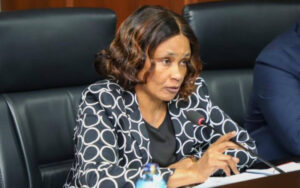A comprehensive look into the petition challenging the Teachers Service Commission CEO recruitment, the court’s decision to exclude an interested party, and what the case means for future public appointments in Kenya.
The contest over who will take charge as the next chief executive of the Teachers Service Commission (TSC) has evolved into a significant legal and governance showdown—one that now threatens to redefine how top public offices are filled in Kenya. What began as a routine recruitment process has escalated into a constitutional dispute centered on transparency, legality, and the rights of citizens to challenge public appointments.
At the center of this unfolding drama is a petition filed by Thomas Mosomi Oyugi, challenging the legality of the entire recruitment process. But even more attention has been drawn by the Employment and Labour Relations Court’s recent decision to reject an attempt by Dr. Adano Salad Kadubo to join the case as an interested party. The ruling, precise and unambiguous, has set a new tone for the proceedings and added fresh complexity to the race to replace outgoing CEO Nancy Macharia.
How the Legal Dispute Began
The petition by Oyugi raised fundamental concerns: Was the CEO vacancy properly declared? Was the recruitment conducted in line with constitutional expectations? And did the Teachers Service Commission meet the threshold of transparency required for public appointments?
These questions alone were enough to give the case national weight. But the controversy deepened when Dr. Kadubo, a longtime aspirant for the CEO position, sought to be enjoined in the case. He argued that he possessed a legitimate interest in the outcome, given that he intended to apply for the role.
However, the court was not convinced.
Why the Court Rejected Dr. Kadubo’s Application
In a clear and firm ruling, the judge stated that Dr. Kadubo’s application added no new substance to the petition. Instead, his claims echoed the same concerns already raised by Oyugi—meaning his participation would not add value to the proceedings.
The judge noted that:
- The issues Dr. Kadubo intended to raise were already central to the petition
- His filings lacked unique evidence or new legal arguments
- His involvement would not materially assist the court in resolving the case
Therefore, his application was dismissed, ensuring that the main petition would proceed without additional parties.
This decision underscores a crucial legal principle: being personally affected or interested is not enough to join a constitutional petition—you must bring something new to the table.
Dr. Kadubo’s Claims: A Closer Look
To understand the court’s decision fully, it’s necessary to examine what Dr. Kadubo argued.
He claimed that:
- The vacancy did not legally exist when the advertisement was published, since outgoing CEO Nancy Macharia was still in office.
- The advertisement was improperly published, appearing only in the My Government newspaper and the TSC website—allegedly not sufficient for nationwide reach.
- The job notice should have been gazetted, in keeping with public service standards.
- The timing could have disadvantaged many potential applicants, including himself.
His contention was that the recruitment process violated constitutional principles of fairness, openness, and equal access.
The TSC’s Counterargument
The Teachers Service Commission, represented by its chairperson, Dr. Jamleck Muturi, opposed the application. According to TSC:
- Dr. Kadubo’s interest was primarily personal
- His application did not meet the legal threshold required for joinder
- The recruitment process adhered to all necessary public service procedures
- The advertisement reached the intended audience
Dr. Muturi insisted that constitutional petitions must be guided by public interest, not individual ambition. He argued that adding people to the petition purely because they hoped to apply for a job would create disorder in the judicial process.
What This Means for Public Litigation in Kenya
The court’s decision goes beyond the TSC recruitment saga. It signals a stronger judicial stance on the participation of interested parties in public interest cases. Courts are increasingly unwilling to allow additional parties unless:
- They have new information
- They bring a distinct legal angle
- Their involvement will enrich the court’s deliberations
This approach prevents petitions from becoming flooded with parties who may slow down proceedings or distort the purpose of the case.
What Happens to the Main Petition Now?
With the distraction of the joinder application behind it, the main petition will now proceed to a full hearing. At stake is the legality of:
- How the vacancy was declared
- How the recruitment was advertised
- Whether the Commission followed constitutional requirements
- Whether Kenyans were given fair and equal access to Apply
If the court finds procedural errors, the entire recruitment exercise could be halted or even nullified. This would have far-reaching implications for the TSC and the Ministry of Education.
Implications for the Education Sector
Leadership at the Teachers Service Commission is more than administrative—it is strategic. The CEO oversees teacher staffing, promotions, disciplinary processes, and national education implementation.
A dispute like this disrupts:
- Succession planning
- Budget execution
- Teacher deployment
- Policy rollout
It also sends a message to future applicants: disputes around public appointments can and will be challenged in court, and institutions must stay above reproach.
A Bigger Conversation About Governance
This case touches on deeper societal questions about governance in Kenya:
- Should recruitment for top public positions meet a higher standard of transparency?
- Should senior vacancies always be gazetted for clarity?
- Are digital postings enough in a country where internet access remains unequal?
- Should the public have a stronger say in the processes of constitutional commissions?
These questions are now part of the national conversation and may influence future reforms.
The Road Ahead
As the petition continues, Kenya watches closely. The court’s eventual ruling will not only determine the fate of the TSC CEO recruitment but may set a powerful precedent for how key public offices must be advertised and filled in the future.
Whether the court upholds or nullifies the recruitment process, one thing is clear: this case has already reshaped the landscape of public appointments in Kenya.




